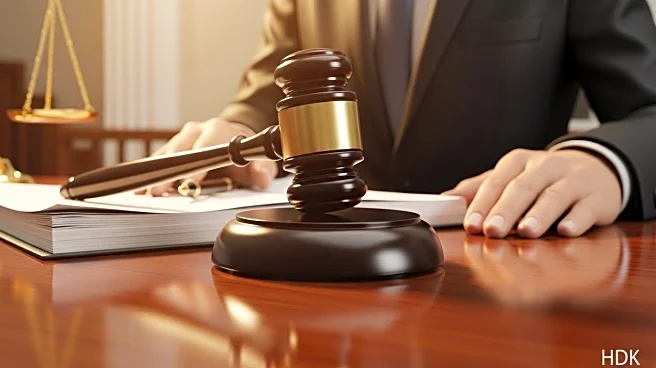What's Happening?
A federal judge has intervened to halt the deportation of Kilmar Abrego García, an immigrant facing deportation to Uganda. U.S. District Judge Paula Xinis issued an order preventing the Trump administration from removing Abrego García from the United States. This decision comes after Abrego García was detained by Immigration and Customs Enforcement (ICE) during a routine check-in in Baltimore. His legal team, led by Simon Sandoval-Moshenberg, reported that ICE officers did not provide reasons for his detention or disclose his location, which they argue violates legal protocols. Homeland Security Secretary Kristi Noem confirmed the detention and stated that Abrego García was being processed for deportation, claiming he posed a threat to American citizens. Abrego García is scheduled to face trial in Tennessee on human smuggling charges in January 2026, and his deportation could hinder his ability to prepare for the trial.
Why It's Important?
The judge's decision to block the deportation highlights ongoing legal and ethical debates surrounding immigration enforcement under the Trump administration. The case underscores concerns about due process and transparency in ICE operations, as well as the potential political motivations behind certain deportation cases. The outcome of this case could have broader implications for immigrant rights and the legal standards applied in deportation proceedings. It also raises questions about the balance between national security claims and individual rights, particularly in cases where the evidence against the accused is perceived as weak or politically motivated.
What's Next?
Judge Xinis has scheduled an evidentiary hearing for October 6 to further examine the legal challenges against Abrego García's deportation. The Justice Department, while disagreeing with the judge's order, has stated it will comply with the decision to keep Abrego García in the U.S. pending the lawsuit. This case will continue to unfold in the judicial system, potentially setting precedents for how similar cases are handled in the future. Stakeholders, including immigrant advocacy groups and legal experts, will likely monitor the proceedings closely, as the outcome could influence future immigration policies and enforcement practices.









